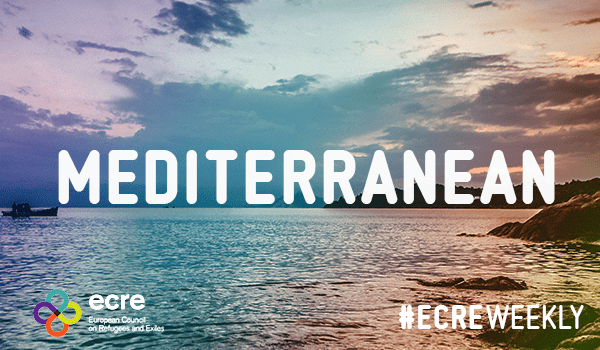The Un Refugee Agency (UNHCR) and the international Organization for Migration (IOM) condemn the return to Libya of 270 people rescued in international waters by the Merchant ship Vos Triton. Hundreds of people rescued in the Maltese SAR zone have been accepted by Italy after authorities in Malta rejected responsibility. European parliament president, David Sassoli urges EU lead on search and rescue on the Mediterranean.
Despite alerts from the NGO hotline Alarm Phone to Libyan, Maltese and Italian authorities, the reconnaissance plane, Seabird operated by Sea-Watch was the sole respondent to a boat in distress in international waters on 14 June. After three days at sea the people aboard a boat adrift with a broken engine and water seeping in were in a state of panic and trying to reach a merchant ship in the area: “We observed multiple people jumping from the wooden boat in an attempt to reach safety aboard the Vos Triton, risking their lives by swimming for hundreds of metres in the open sea,” stated Sea-Watch spokesman Felix Weiss. The Vos Triton that had remained passive, now rescued the entire group but handed them over to the so-called Libyan coast guard returning them to detention in Libya despite being in international waters. In a statement UNHCR and IOM: “reiterate that no one should be returned to Libya after being rescued at sea. Under international maritime law, rescued individuals should be disembarked at a place of safety”. Further, the agencies state: “Migrants and refugees disembarked in Libya often end up in appalling conditions where they may be exposed to abuse and extortion. Others go missing and are unaccounted for, raising fears that some may have been channelled into human trafficking networks”. According to IOM Libya 2,083 migrants were rescued/intercepted at sea and returned to Libya between 6 – 12 June and the total for 2021 as of 12 June is 12,794. Further, UNHCR Libya reported that on 13 June: “Over 1,000 persons were returned in 2 operations in Zawiya and 3 others in Tripoli”. UN Special Rapporteur on The Human Rights of Migrants, Felipe González Morales has released a report on the practice of pushbacks and its serious negative impact on the human rights of migrants stating on Libya: Since 2016, more than 60,000 migrants have been disembarked in Libya following interception at sea, sometimes by instructing private vessels to proceed to Libya, despite the fact that Libya is not considered to be a safe port for disembarkation for migrants due to well-documented risks of human rights violations, including arbitrary detention, torture, enforced disappearance, sexual and gender-based violence, exploitation and trafficking”. The UN Human Rights Office (OHCHR) recently reported of: ”Unconscionable sexual violence against migrant women and girls in Tripoli’s Shara’ al-Zawiya detention centre – suicide attempts out of desperation & starvation,” stating: “Libya is not a safe port of return for migrants”.
In Lampedusa a local fisherman recently managed to save 24 lives and 600 people arrived within just 24 hours on June 15. The island’s hotspot with a capacity of 250 people now holds more than 1,300. MSF Sea announced on 17 June the disembarkation in Augusta, Sicily of 410 survivors aboard the Geo Barents rescue vessel. The group were stranded at sea for seven days with Maltese authorities rejecting it permission to port despite the last four of its rescue operations being conducted in the Maltese SAR zone. Reportedly, Italy has also agreed to accept 86 people including children and pregnant women rescued by the small German rescue vessel Nadir when they were adrift in the Maltese SAR zone. Reportedly, Maltese authorities rejected responsibility with reference to their alleged request to a Libyan merchant ship to intervene with the Libyan ship denying it was contacted. Following “intense” talks between the Maltese and Turkish foreign ministries 97 survivors rescued by a Turkish cargo ship have been allowed to disembark in Malta.
EU parliament president David Sassoli on 14 June stated at the inter-parliamentary Conference on Asylum and Migration: “I believe it is our duty first of all to save lives. It is no longer acceptable to leave this responsibility only to NGOs, which perform a substitute function in the Mediterranean. We must go back to thinking about joint action by the European Union in the Mediterranean that saves lives and tackles traffickers. We need a European search and rescue mechanism at sea, which uses the expertise of all actors involved, from Member States to civil society to European agencies”. Amnesty International, Human Rights Watch, and ECRE have launched a Plan of Action with twenty steps to protect people on the move along the Central Mediterranean route including search and rescue, disembarkation and relocation.
As of 12 June, 677 people have died or gone missing on the central Mediterranean in 2021.
For further information:
- ECRE, Med: EU Tour de Migration Control Continues as Do Returns to Libya and Crack-Down on Civil SAR despite No Evidence of Pull-factor, June 2020
- ECRE, Med: As European Migration Control Efforts in North-Africa Continue and EU Rejects Responsibility for Death at Sea – People Keep Dying, June 2021
Photo: ECRE
This article appeared in the ECRE Weekly Bulletin. You can subscribe to the Weekly Bulletin here.

